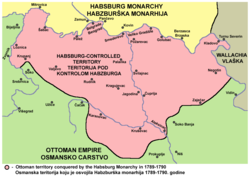Habsburg-occupied Serbia (1788-92)
| Habsburg-occupied Serbia | ||||||||||||
| Serbien | ||||||||||||
| Territory of the Habsburg Monarchy | ||||||||||||
|
||||||||||||
|
Habsburg-controlled territory in 1789–90
|
||||||||||||
| Capital | Belgrade | |||||||||||
| Languages | Serbian, German | |||||||||||
| Religion |
Roman Catholic, Serbian Orthodox |
|||||||||||
| Government | Military administration | |||||||||||
| Historical era | Early modern period | |||||||||||
| • | Habsburg occupation | 1788 | ||||||||||
| • | Austro-Turkish War | 1787–91 | ||||||||||
| • | Habsburg withdrawal, Treaty of Sistova | 1792 | ||||||||||
|
||||||||||||
Koča's frontier (Serbian: Кочина крајина/Kočina krajina) refers to the Serbian territory established in the Sanjak of Smederevo, Ottoman Empire, during the Austro-Turkish War (1787–91). The Habsburg-organized Serbian Free Corps, among whom were prominent Koča Anđelković (hence the historiographical name), initially held the central part of the sanjak, between February and September 7, 1788; after the Austrians entered the conflict the territory was expanded and became a Habsburg protectorate under military administration, called Serbia (German: Serbien). After the Austrian withdrawal and Treaty of Sistova (1792), the territory was regained by the Ottomans.
The Serbs had taken an active part in the wars fought in the Balkans against the Ottoman Empire, and also organized uprisings. Because of this, they suffered persecution and their territories were devastated. Major migrations from Serbia into Habsburg territory ensued.
Due to conflicts around Caucasus in 1786, relations between Russia and the Ottomans soured. The next year, Joseph II and Catherina II met in Crimea for the second time, which prompted the Ottomans to declare war on Russia. In the meantime, the Austrians prepared the Serb refugees for war.
A Serbian Free Corps of 5,000 soldiers had been established in Banat, composed of refugees that had fled earlier conflicts in the Ottoman Empire. The Corps would fight for liberation of Serbia and unification under Habsburg rule. The main commander was the Austrian major Mihailo Mihaljević. Among volunteers were Aleksa Nenadović and Karađorđe Petrović, Stanko Arambašić and the prominent Radič Petrović and most of all, Koča Anđelković. The Austrians used the Corps in two failed attempts to seize Belgrade, in late 1787 and early 1788.
...
Wikipedia


